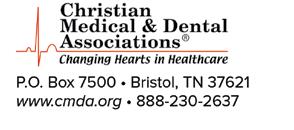





Iam so sorry if you could not attend the 2023 CMDA National Convention in the Cincinnati, Ohio area in April, but I hope you’ll join us at the Ridgecrest Conference Center in Black Mountain, North Carolina on May 2-5, 2024. We had an incredible lineup of plenary and breakout speakers earlier this year at the Northern Kentucky Convention Center with more than 1,000 Christian healthcare professionals, students, residents and spouses registered. I was particularly amazed by the synergy between the plenary talks of Princeton Law’s Professor Robert George and University of Michigan’s Dr. Kristin Collier—who are good friends by the way. Professor George inspired us with the challenge, “Courage is contagious,” especially when demonstrated by one or more individuals who do not waver when put to the test in the academic public square. We then heard the remarkable testimony of Dr. Collier whose experience in Ann Arbor, Michigan vividly put that truth on display.
Dr. Collier made national news a year ago when subjected to a “white coat walkout” by a group of first-year medical students at the University of Michigan. These students ardently opposed her pro-life views, immediately after the Dobbs v. Jackson Women’s Health Organization U.S. Supreme Court decision in June 2022. Dr. Collier could have easily backed out, reasoning that it would not have been prudent or even safe to make her speech that day (as there were death threats). To the credit of university administration, they maintained their support of this honorary invitation to Dr. Collier, an honor reserved for one medical school faculty member each year. Dr. Collier was chosen by other faculty members as a colleague who demonstrated exemplary academic achievement and teaching distinction.
After her plenary talk at the National Convention, she was surrounded by students and graduate members who wanted to thank her for taking such a courageous stand in the face of such opposition. I have read follow-up reports from several medical students who attended the National Convention (more than 160 this year). One Minnesota student’s testimony is representative of comments shared by several peers:
“As a medical student, navigating through this profession in a predominantly secular environment comes with its challenges. One of the things that resonated with me was the plenary session by Dr. Kristin Collier from the University
of Michigan, who made headlines over her anti-abortion views and received significant backlash after being chosen as a commencement speaker. I was in awe of her boldness and, notably, her choice to remain still and silent, which emulated the moments Jesus remained silent during His persecution. It was a powerful reminder that our faith is not separate from our work, but rather, it is an integral part of who we are and how we practice medicine.”
I emphasized that final line of the testimony because it captures the essence of CMDA’s passion to see Christians in healthcare bringing their faith to work. Our faith (and its impact upon our conscience) should not be disintegrated from our practice of medicine. Professor George described the conscience as “a stern monitor, not a giver of permission slips” and my duty to follow conscience as a healthcare professional is “preeminent, even if I don’t welcome the dictum.”
I’ve heard Dr. Collier speak twice since then. Once at the Colson Center National Convention in Indianapolis, Indiana in mid-May, and then online as part of a Princeton University event in late May. Her challenge to the Princeton audience serves as a clarion call to our government and professional associations to protect healthcare conscience freedoms: “We need to continue to fight to preserve physician conscience and laws that protect the rights of physicians to opt out of procedures and treatments that are an affront to their conscience. Physician conscience is the most valuable tool we have, and we should reframe it as such.”
Our CMDA Ethics Committee, Board of Trustees and House of Representatives drafted and approved a position statement on healthcare conscience freedoms in 2021. You can access this excellent resource by visiting cmda.org/ethics. If you would like to hear Dr. Collier’s testimony from the National Convention, check out our weekly CMDA Matters podcast from May 25, 2023 on your favorite podcast platform or visit cmda.org/cmdamatters.
Mike Chupp, MD, FACS, is the CEO of CMDA. He graduated with his medical degree from Indiana University in 1988 and completed a general surgery residency at Methodist Hospital in 1993. From 1993 to 2016, he was a missionary member of Southwestern Medical Clinic in St. Joseph, Michigan, while also serving as a career missionary at Tenwek Mission Hospital in Kenya.
EDITOR

Rebeka Honeycutt
EDITORIAL COMMITTEE
Gregg Albers, MD
John Crouch, MD
Autumn Dawn Galbreath, MD
Curtis E. Harris, MD, JD
Van Haywood, DMD
Rebecca Klint-Townsend, MD
Debby Read, RN AD SALES
423-844-1000
Ahaa! Design + Production PRINTING
Pulp
CMDA is a member of the Evangelical Council for Financial Accountability (ECFA).


CMDA Today™, registered with the U.S. Patent and Trademark Office. Fall 2023, Volume LIV, No. 3. Printed in the United States of America. Published four times each year by the Christian Medical & Dental Associations® at 2604 Highway 421, Bristol, TN 37620. Copyright© 2023, Christian Medical & Dental Associations®. All Rights Reserved. Distributed free to CMDA members. Non-doctors (US) are welcome to subscribe at a rate of $35 per year ($40 per year, international). Standard presort postage paid at Bristol, Tennessee.
Undesignated Scripture references are taken from THE HOLY BIBLE, NEW INTERNATIONAL VERSION®, NIV®
Copyright © 1973, 1978, 1984, 2011 by Biblica, Inc.® Used by permission. All rights reserved worldwide. Other versions are noted in the text.

P.O. Box 7500, Bristol, TN 37621 888-230-2637
main@cmda.org•www.cmda.org
If you are interested in submitting articles to be considered for publication, visit www.cmda.org/publications for submission guidelines and details. Articles and letters published represent the opinions of the authors and do not necessarily reflect the official policy of the Christian Medical & Dental Associations. Acceptance of paid advertising from any source does not necessarily imply the endorsement of a particular program, product or service by CMDA. Any technical information, advice or instruction provided in this publication is for the benefit of our readers, without any guarantee with respect to results they may experience with regard to the same. Implementation of the same is the decision of the reader and at his or her own risk. CMDA cannot be responsible for any untoward results experienced as a result of following or attempting to follow said information, advice or instruction.
Northeast
Are you listening to CMDA’s podcast with CEO Dr. Mike Chupp? CMDA Matters is our popular weekly podcast with the latest news from CMDA and healthcare. A new episode is released each Thursday, and interview topics include bioethics, healthcare missions, financial stewardship, marriage, family, public policy updates and much more. Plus, you’ll get recommendations for new books, conferences and other resources designed to help you as a Christian in healthcare.
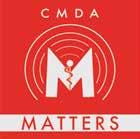
Listen to CMDA Matters on your smartphone, your computer, your tablet…wherever you are and whenever you want. For more information, visit www.cmda.org/cmdamatters.
Have you downloaded CMDA Go yet? Our mobile app, CMDA Go, is now available to download on Apple and Android mobile devices. Visit your device’s app store to download it today.

In the CMDA Go app, you can set up your personal CMDA profile, check out the latest news from CMDA, listen to CMDA Matters and other podcasts, renew your membership and make your dues payments, access a variety of downloadable resources, interact with other members through the discussion forms and join group chats.
For more information, visit www.cmda.org/app.
The CMDA Learning Center offers complimentary continuing education courses for CMDA members. This online resource is continuing to grow with new courses to help you in your practice as a Christian healthcare professional.
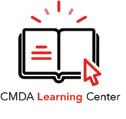
More than 100 hours of continuing education are now available at NO COST to CMDA members. For more information and to access the CMDA Learning Center, visit www.cmda.org/learning.
One of the latest additions to the resources provided by CMDA is an on-demand video series called Faith Prescriptions. This 25-part video series (featuring 10 core sessions) provides training on everything from LGBTQ issues in the healthcare arena, to praying with your patients and sharing your faith in ethical and appropriate ways with colleagues and patients.

Faith Prescriptions is a revision of the program Grace Prescriptions, which has been in circulation for several years on DVD. This updated and improved series is available as video-on-demand. It is free to CMDA members and simply requires your member login and password to access all sessions, as well as all video training sessions, within the CMDA Learning Center.
Get started today by visiting www.cmda.org/learning.
Dates and locations are subject to change. For a full list of upcoming CMDA events, visit www.cmda.org/ events.
2023 Women Physicians & Dentists in Christ Annual Conference
September 7-10, 2023 • Hilton Head Island, South Carolina
Trophy Trout Fly Fishing
September 28-30, 2023 • Bristol, Tennessee
CMDA Midwest 2023 Fall Conference
September 29 – October 1, 2023 • Muskegon, Michigan
501 Foundations in Coaching
October 3 – November 7, 2023 • Virtual
Mentoring with a Coach Approach
October 5 – November 2, 2023
• Virtual
Biblical Turkey Tour – Seven Churches of Revelation
October 21-31, 2023
Optional Extension: October 28-31, 2023

CMDA Northeast Annual Conference
October 27-29, 2023
• North East, Maryland
CMDA Marriage Enrichment Weekend
October 27-29, 2023
• Lititz, Pennsylvania
Pre-field Orientation for New Healthcare Missionaries
November 6-9, 2023
• Louisville, Kentucky
Israel Tour – In the Footsteps of Jesus
November 8-17, 2023
Global Missions Health Conference 2023
November 9-11, 2023
• Louisville, Kentucky
2024 CMDA National Convention
May 2-5, 2024
• Black Mountain, North Carolina
As Christians, we are called to speak truth into ethical issues and courageously stand up for what’s morally right according to our beliefs. However, in order to engage others in these discussions with grace and kindness, first we need to arm ourselves with knowledge and understanding of each of these topics.
Bridging the Gap: Where Medical Science and Church Meet is a small group study developed by expert healthcare professionals. The curriculum is designed to ask difficult, thought-provoking questions as we seek the truth found in God’s Word about the ethical issues facing Christians today. Topics include addictions, beginning of life, end of life, gender identity, right of conscience and sexuality. For more information and to download the curriculum, visit www. cmda.org/bridgingthegap.

Please encourage students, residents and fellows to submit an abstract for CMDA’s seventh annual VIE Poster Session, which will take place during our 2024 National Convention. Presentations in areas of spirituality, ethics, education, computational biology, mathematical modeling, biophysics, biotechnology, biomedical science, medicine, surgery, dentistry, nursing and medical humanities are all welcome! Visit cmda.org/vie to submit an abstract by January 31, 2024. Cash prizes are awarded!
CMDA member Gerald Swim, of Louisville, Kentucky, passed away on June 28, 2023, at the age of 88. Gerald was director of the continuing medical education program at the University of Louisville for several years. He is credited with having the vision to begin a continuing education program within Christian Medical Society, now Christian Medical & Dental Associations. The program’s initial goal was to provide continuing education to missionaries via Continuing Medical and Dental Education (CMDE)

conferences. To accomplish that, he guided the process of becoming accredited by the Accreditation Council for Continuing Medical Education (ACCME). Thanks to his efforts, CMDA’s continuing education program later expanded to provide educational activities for members in the U.S.
Gerald was a godly man, admired by all who knew him. He is survived by his wife of 66 years, Bonnye Swim, children Jessica (Geoffrey Hale) and David (Lauren); grandchildren Brooks Ervin (Kristen), Tyler Swim, Courtney Swim, Lindsay Hale and great-grandchildren Evan, Kathleen and Addison. We are thankful for the impact Gerald had in bringing the hope and healing of Christ to the world.
Do you have any member news to share with CMDA? What about an award or achievement you received? We love to hear from our members, so please share your news with us at communications @cmda.org
Our hearts are with the family members of the following CMDA members who have passed in recent months. We thank them for their support of CMDA and their service to Christ.
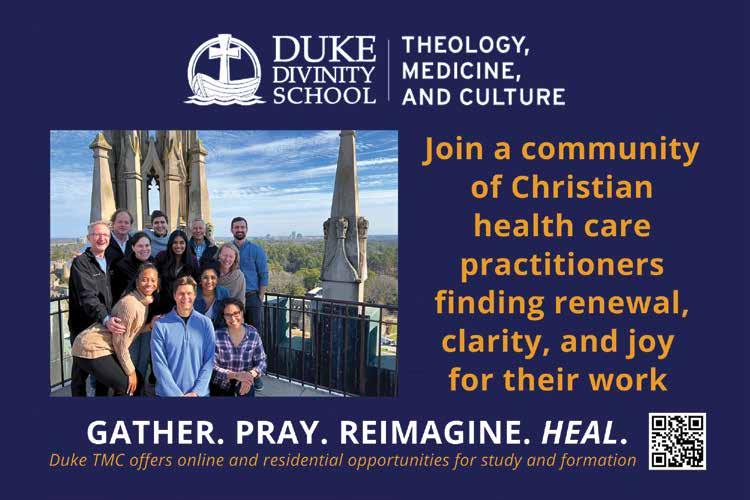
• Robert M. Allman, MD – Potomac, Maryland Member since 1989
• George Cox, MD – Suffern, New York Member since 1995
Gifts received April through June 2023
Anonymous in honor of Lem Howard Mrs. Hallie H. Herring in honor of Dr. Lee Herring
For more information about honorarium and memoriam gifts, please contact stewardship@cmda.org
Have you visited the CMDA Bookstore recently? We’ve made some changes in the last few months, and we’re excited for you to start shopping again! All of CMDA’s resources that we’ve published, plus a whole host of medically reliable and biblically sound materials, are now available for you through our partnership with ChristianBook.com. To find your copy of books like Leadership Proverbs by Dr. David Stevens and Pastor Bert Jones or Whispers by Dr. Al Weir, visit www.cmda.org/bookstore.
Among all of our various ministries, CMDA’s Specialty Sections give you the unique opportunity to equip, network and fellowship with colleagues in your specific healthcare specialty. Have you taken advantage of this great opportunity to develop community with your colleagues in CMDA?
Organized by CMDA members, the sections listed below provide a wealth of resources for those who wish to connect with their colleagues.
1. Addiction Medicine Section (AMS)
2. Christian Academic Physicians and Scientists (CAPS)
3. Christian Healthcare Executive Collaborative (CHEC)
4. Christian Physical Rehab Professionals (CPRP)
5. Christian Surgeons Fellowship
6. Coalition of Christian Nurse Practitioners (CCNP)
7. Dental Hygiene Section
8. Dermatology Section
9. Family Medicine Section (FMS)
10. Fellowship of Christian Optometrists (FCO)
11. Fellowship of Christian Physician Assistants (FCPA)
12. Fellowship of Christian Plastic & Reconstructive Surgeons (FCPRS)
13. Neurology Section
14. Obstetrics and Gynecology Section
15. Psychiatry Section
16. Ultrasound Education (UES)
Don’t see a section for your specialty? New sections are currently under development with CMDA’s Campus & Community Ministries. Contact ccm@cmda.org for more information about getting involved or starting a section.
Did you know CMDA’s Center for Well-Being has been expanding? We’ve been expanding our list of services for you, our CMDA members. Our mission is “coaching and caring for healthcare professionals.” We have been observing and listening to the needs of our members as they navigate challenging times.

Did you know we have experienced professional coaches available to help you through the opportunities and challenges you face in healthcare? Email us at coaching@cmda.org to learn more. Did you know we offer certified coaching training courses that prepare you with the skills for coaching those in your sphere of influence? Our two popular continuing education qualified coaching courses are having a tremendous impact in the healthcare community.
Did you know the Marriage Ministry falls under the Center for Well-Being? We offer Marriage Enrichment Weekends and retreats for our membership to refresh and restore their marriages. Did you know the Medical Malpractice Ministry would love to help you as you walk through the difficult challenge of facing your malpractice lawsuit? We know this can be a stressful time in your life, and we have a team of doctors who’ve been where you are and want to help you through the challenge.
Did you know we now offer classes and resources for mentoring with a coach approach? You can gain insight into investing in the next generation of healthcare professionals. Did you know we now offer coaching and member care for our healthcare missionaries? Did you know that in addition to the professional care you can receive, we are also investing in pastoral care for our members?
To learn more about the ministries available in the Center for WellBeing, visit www.cmda.org/wellbeing.
We can serve others through healthcare missions in countless ways as we seek to follow our Savior and care for the lost, poor and marginalized. Our question should not be IF we are living on mission, but rather WHERE and HOW we are doing it. If you have questions about getting started, check out CMDA’s Center for Advancing Healthcare Missions (CAHM). We mobilize and support healthcare professionals to use their skills to help people encounter Jesus, both here in the U.S. and around the world. Wherever you are in your healthcare journey, we are here to equip you to live on mission each and every day. For more information, visit www.cmda.org/cahm.

It was a busy morning, like every morning in OB/Gyn practice.
My next patient was an add-on from one of my associates—a patient of his who needed a colposcopy but couldn’t fit into his schedule. I preferred not to do procedures on patients I’d never met, so my first task was to get some basic medical history since the prior notes were sparse. This added pressure to my schedule, because ordinarily, I knew the patients well who I scheduled for procedures.
I saw the patient was young and figured her history wouldn’t be complicated. As I walked into the procedure room to introduce myself, little did I know just how complex this visit would become.
Sara was seated on the exam table, looking quite nervous, and her mother was seated on the other side of her. After some preliminary introductions, I said I had a few questions before we began the colposcopy. Colposcopy 101 teaches us to determine the patient’s pregnancy status, because it directly impacts the decision to take biopsies. The pregnant cervix can bleed profusely during a biopsy, so that was my first question. Sara didn’t seem to be able to recall her last menstrual period, said she had regular menses and was without any specific medical complaints.
I told her I would need a urine sample to make sure she wasn’t pregnant—she said she wasn’t but was visibly more nervous. I asked her to lay back so I could examine her abdomen, and it was immediately apparent her uterus was the size of a 20-week pregnancy. I could see this appointment spinning out of control as I rolled an ultrasound machine into the room. Sure enough, a quick scan of her abdomen revealed a living intrauterine pregnancy in mid-trimester!
As Sara looked at the ultrasound screen, she could no longer deny the truth: she was five months pregnant. We’ve all faced these situations—unexpected findings, twists and turns in the diagnostic process as patients belatedly reveal new and significant symptoms. My strategy went from how to help this young woman understand her pap test results, why she needs the colposcopy and allay her fears of cervical cancer to dealing with a full-blown crisis pregnancy. She was 18 years old and did not want to be pregnant. I had to quickly pivot and at-
tempt to give this young woman some life-affirming counsel about her pregnancy decision.

I was on the board of our local pregnancy center and had completed their volunteer training, so I knew the basics of how to approach patients who are considering abortion, but I had no practical experience to draw from. Plus, the healthcare professional’s nemesis: time—I was running out of it fast. I plunged ahead with exploring her thoughts about this pregnancy, would she consider alternatives to abortion? I broached the subject of adoption only to have her mother chime in with her “horrible” experience as an adopted child. By the time Sara left my office, I was nearly as frazzled as she! As I reflect on that day, I wish I had been ready with a strategy and resources for patients like Sara.
My hope is to give you a solid framework along with helpful resources so you are prepared for the next patient who walks into your

office with an unexpected pregnancy. This information is applicable to practitioners of all different specialties, not just primary care. I’m not going to assume we’re all on the same page, so let’s explore a series of foundational questions that will inform our action steps.

Human life is uniquely precious, made in the image of God and worthy of protection. In Jeremiah 1:5, we see our value—even before the womb: “Before I formed you in the womb I knew you, before you were born I set you apart….”
In Psalm 139:13-16, God reveals His heart for us:
“For you created my inmost being; you knit me together in my mother’s womb. I praise you because I am fearfully and wonderfully made; your works are wonderful, I know that full well. My frame was not hidden from you when I was made in the secret place, when I was woven together in the depths of the earth. Your eyes saw my unformed body; all the days ordained for me were written in your book before one of them came to be.”
A number of Christians begin where I did in my pro-life journey: “We must do something to save babies lost through abortion!” Yes, we must be a voice for the voiceless and the infirm, and we must uphold the sanctity of human life from fertilization to natural death. How we do this matters greatly when it comes to reaching the hearts and minds of the parents of these precious babies.
When I meet a patient facing an unexpected pregnancy, I am acutely aware their primary concern is for their own “survival.” Frederica Mathewes-Green1 famously said women choose abortion much like an animal caught in a trap “chooses” to gnaw off its leg to get free. Countless women feel trapped by their circumstances and believe the lie society tells that abortion is a simple solution to their “problem.”
Women often present in crisis mode and benefit from a safe, judgment-free place where they feel accepted and heard. I don’t always understand why they are considering abortion, but I remind myself that I, too, have a natural bent to be tempted to sin and I try not to stand in judgment. I often remind myself that for patients who don’t confess Christ—I should not hold them accountable to a creed they do not claim. This brings me to another facet of understanding and caring for women and men who seek abortion.
Approximately 50 percent of pregnancies are unplanned and at risk for ending in abortion.2 For a pregnant woman, what factors into making an abortion decision? According to the Guttmacher Institute, most women cite more than one reason why
they are considering abortion, including relationship problems, lack of finances, interference with work/education and/or they care for other kids.3 The top reasons all center around lack of support, which, in many instances, would be helped by the presence of a caring partner or family member. Your compassionate and caring support can make all the difference.
To help you identify who is at risk for making an abortion decision, consider the characteristics of women who chose abortion:4
• Nearly two-thirds have at least one child—so they know about the wonder of new life.
• One in every four women have had an abortion by age 45—think about this next time you meet a woman in this age bracket and realize she may be harboring wounds from past abortions.
• 64 percent of all abortions occur in 20- to 29-year-old women.
• 54 percent report Christian affiliation—this can open a dialog about how God factors into their decision and how they reconcile an abortion against the tenets of their faith.
• 75 percent of abortions occur among low-income women.
Notice that a full quarter of abortions occur in women who are middle-income and above. That’s a large number when you think of the approximately 900,000 abortions performed in America annually.5 Understand that EVERY woman is at risk for abortion—regardless of their faith tradition, marital status or any other demographic. I’ve seen married women with plenty of resources consider abortion because of paternity issues and homeless women who fiercely chose life in the face of large obstacles.
fore undergoing a procedure that will change her life forever.

It is clear from more than 150 scientific studies that induced abortion increases the risk of preterm birth with a dose-effect increased risk with each subsequent abortion.7 Sufficient evidence in peer-reviewed journals implicates induced abortion as a risk factor for major depression, anxiety disorders, symptoms consistent with post-traumatic stress disorder, and suicidal thoughts and behavior.8
Less is known about the effects of abortion on men. Here’s what we’ve learned: men who were part of an abortion decision may experience emotional numbing, failed relationships, sexual difficulties, moral pain, symptoms consistent with post-traumatic stress disorder, grief, guilt, anxiety, powerlessness, anger and exhibit controlling coercive behavior.9
It is well known that carrying one’s first pregnancy before the age of 30 to term provides some protection against future breast cancers.10 In addition, it is also widely recognized that women who deliver prematurely (prior to 32 weeks gestation) are at increased risk of future breast cancer.11 Lastly, a majority of worldwide peer-reviewed studies reflect that induced abortion is an independent risk factor for the future development of breast cancer.12
As Christ-followers who happen to be healthcare professionals, we share a common concern for the physical well-being of our patients and for their spiritual health. What are the spiritual needs of those considering abortion? In learning from men and women who were involved with an abortion decision or who experienced one, we know one’s relationship to God and others may be tainted by shame and guilt.13
Care Net commissioned a LifeWay survey that revealed the most influential person in their pregnancy decision was the father of the baby. The second most influential person was their personal physician (not the abortion provider).6 We as healthcare professionals have the distinct opportunity to affect change and motivate our patients toward healthy lifestyle choices. And choosing life is one of them. We provide counsel and education to our patients about risks and benefits every day. While there are no proven benefits to induced abortion, there are many potential risks. Every woman deserves full informed consent be-
Mifepristone is a potent anti-progesterone and works primarily by blocking the effects of progesterone on the endometrium, breaking down the embryo’s attachment over several days. If misoprostol is not taken, there is a window of opportunity to administer natural progesterone to out-compete mifepristone for the progesterone receptors in the endometrium, reestablishing the embryo’s connection. The reality is that some women do change their mind after taking mifepristone and are desperate to continue their pregnancies. According to a 2018 retrospective chart review of 754 patients, 68 percent of women who took the high dose oral progesterone protocol successfully continued their pregnancies and gave birth to healthy babies.14 Based upon available evidence, the use of natural progesterone is associated with a significantly higher likelihood that a pregnancy will continue after exposure to mifepristone compared to no intervention (25 percent pregnancy continuation rate).15
It’s important to put together a local resource list that includes life-affirming specialists, such as pro-life maternal-fetal-medicine experts when the baby has an abnormality or a life-limiting diagnosis. Your local pregnancy center most likely has already compiled a referral list they will be glad to share.
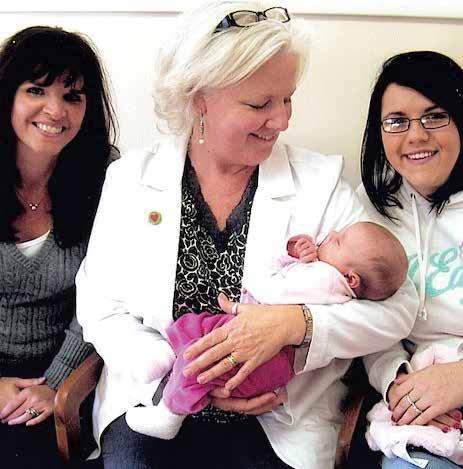
Use life-affirming language that points to the humanity and personhood of the baby. For example, say “life-limiting” instead of “incompatible with life.” Challenge the default assumption that “it’s better for the baby to end her life” and that it’s better for the mom and dad to terminate the pregnancy. The decision to carry until birth or the baby’s natural death varies by diagnosis, but one large study observed that approximately 20 to 60 percent of women chose to carry after learning about the presence of a chromosomal abnormality.16 Educate couples about perinatal hospice, or the newer term perinatal palliative care, as a life-affirming option for couples whose unborn children have a terminal condition.17

Pregnancy centers first began operating prior to the 1973 U.S. Supreme Court Roe v. Wade decision. They are an invaluable resource for women and men facing difficult pregnancy decisions. Founded in 1975, Care Net envisions a culture where women and men faced with pregnancy decisions are transformed by the gospel of Jesus Christ and empowered to choose life for their unborn
children and abundant life for their families. According to the most recent Charlotte Lozier Institute report, Care Net, Heartbeat International and the National Institute of Life and Family Advocates (the three largest national pregnancy center network affiliation organizations) served nearly one million clients providing more than 266 million dollars of estimated support!18
Pregnancy centers typically provide urine pregnancy testing, pregnancy confirmation ultrasound exams, baby clothes, baby supplies and pregnancy and parenting classes—all free of charge. The centers that provide medical services function in accordance with laws that govern the practice of medicine and are typically staffed by nurses with a licensed physician serving as medical director, providing clinical oversight. As the national medical director for Care Net, every week I speak to pregnancy centers desperately seeking a medical director. Physicians from any specialty may serve— please pray and see if God is putting this on your heart.
Unless you’re like me and work or volunteer in your local pregnancy center, you have limited time in your clinical practice to provide the depth of care that is available in most pregnancy centers. Get to know the one(s) nearest your office.

The landscape of abortion access in the U.S. has changed dramatically in the last two years. Roe v. Wade was reversed in 2022, but the damage was done. Abortion is in the fabric of our society. It will take deep change in the hearts and minds of the people before abortion can become unthinkable.
If mifepristone is removed from the market, it won’t eliminate access to it. Plus, abortion advocates intend to substitute misoprostol alone as an acceptable alternative.19 This drug is not FDA approved for abortion,20 but it is used off-label and is much less effective.21
The U.S. is a hodgepodge of abortion access. Whether you are in a state where abortion is banned, or where it is performed up to term, drug-induced abortion is available in all 50 states. Women, men and children may purchase abortive drugs from unreliable overseas pharmacies and have them illegally shipped to the U.S.22 In addition, if you are located in a state where elective abortion is illegal, women may still have access through proabortion groups that provide travel costs to other states where abortion is available and even floating, offshore abortions.23
Whether a woman has a telemedicine “visit” and goes to the local pharmacy and picks up the abortive drugs, or orders them online, she ultimately takes the pills herself and effectively “gives” herself an abortion. She faces the risks of hemorrhage, infection and failed procedure all alone, plus the unknown psychological impact of seeing a formed baby pass from her body.
Induced abortion is so much a part of the fabric of society that we need to occasionally remind ourselves that it has nothing to do with the purpose and practice of medicine. It is time to get practical and equip you to face this brave new world.
Did you know that 25 percent of women have had at least one abortion by the age of 45?24 Some post-abortive women and men have complex feelings that linger unresolved, sometimes for years.25 A number of hurting people come into your office

• Be proactive: put together your toolkit.
• Raise awareness among staff and foster a culture where patients feel safe enough to share.
• Find the pregnancy center(s) closest to your office using the pregnancydecisionline.org locator. 27
• Get a stack of the local pregnancy centers’ brochures and/or business cards.
• Put the contact information for the local pregnancy center and website URL on the patient resource list.
• Identify pro-life obstetricians and maternal fetal medicine specialists with the aaplog.org physician locator. 28 Put together a list to give to patients.
• Order pregnancy decision options coaching tools from CareSource (tip cards, Before You Decide magazine, brochure, tablet app). 29
• If no pregnancy centers are near you, churches can be trained to come alongside people with crisis pregnancies through Care Net’s Making Life Disciples curriculum. 30 Contact Care Net to identify participating churches in your area.
• Screen for abortion risk. Regardless of your specialty, incorporate reproductive history questions in your medical intake for both women and men. Ask every woman of reproductive age if she could be pregnant.
• Find out how they feel about having a baby: “What are your plans for this pregnancy?” Listen to their concerns and fears. Offer emotional support.
• Provide the Pregnancy Decision Line website and number: 866-9254610. 31
• Educate the importance of confirming her pregnancy with an ultrasound and give her the number of the nearest pregnancy center that can do this.
• If time permits, use one of the options coaching tools, provide education about abortion procedures and risks, adoption and parenting.
• Educate her about abortion pill reversal or give out the Care Net APR tip card.
• If they are post-abortive, gently explore if they are experiencing regret, unresolved feelings or symptoms consistent with post-traumatic stress, and refer accordingly. (Most pregnancy centers are equipped to provide abortion regret support but are not a substitute for professional counseling).
• Give a copy of your resource list and offer to pray for your patient.
• Prenatal care: OB/Gyn physicians in your area.
• Pregnancy confirmation ultrasound: Local pregnancy center phone number and address.
·
every day, suffering in silence. You will not discover their struggle unless you ask them specific questions. These feelings can be buried behind a shield of denial. Early on in my practice, I intentionally asked my patients who had experienced a pregnancy termination how they felt about it. I stopped being surprised when tears flowed, and I was so glad I helped give voice to their pain so they could begin the healing process. Most pregnancy centers provide emotional support through their abortion recovery programs, so consider referring patients.
Three lives hang in the balance during the decision phase of an unplanned pregnancy. According to one study, the median time from suspecting a pregnancy to confirming was four days, zero days to the abortion decision and nine days to obtaining an abortion.26 Consider the unplanned pregnancy an emergency and prioritize it accordingly. See the handout in the column to the left for practical ways you can help.
Don’t be surprised if you feel inadequate or wish you could have done more. I work in a pregnancy center and have all the tools to help my patients make life-affirming decisions. The truth is not all of them choose life. I find myself debriefing afterward, recalling things I wish I’d said. Then I remind myself that I am called to speak the truth in love, with Christ-like compassion, but the final decision is not up to me. That can be uncomfortable and incredibly sad. Remember my patient Sara from the beginning? I wish I could tell you that Sara chose to carry her baby and lived happily ever after. The truth is she was lost to follow up. I was never able to connect with her and find out what happened to her and her beautiful little baby. I entrusted both into our heavenly Father’s capable hands a long time ago. The most important thing you can do for a patient facing a crisis pregnancy is to share the hope that is within you and introduce them to Jesus Christ.
1 https://www.azquotes.com/author/17813-Frederica_ Mathewes_Green
• Find a pregnancy center locator: pregnancydecisionline.org/find-apregnancy-center.
• Considering abortion or just needing to talk to someone who understands: Pregnancy Decision Line 866-281-3029.
• Prescription for prenatal vitamins.
• Education on abortion:
a. Pregnancy Decision Line website pregnancydecisionline.org/learn
b. Care Net abortion education brochure or tip card.
• Abortion regret: refer to a local pregnancy center, abortionhealing.org or call 703-770-8000.
• Abortion pill reversal helpline: 877-558-0333.
2 Guttmacher Institute. (2023, April 27). Pregnancies in the United States by desire for pregnancy: Estimates for 2009, 2011, 2013, and 2015 | Demography | Duke University press. Retrieved from https://doi.org/10.1215/00703370-10690005
3 Lawrence, B., Finer, L. F., Frohwirth, L., Dauphinee, A., Singh, S., & Moore, A. M. (2005). Reasons U.S. women have abortions: Quantitative and qualitative perspectives. Perspectives on Sexual and Reproductive Health, 37(3), 110-118. doi:10.1111/j.1931-2393. 2005.tb00045.x
4 Guttmacher Institute. (2022, June 27). Induced abortion in the United States 2019 Fact Sheet. Retrieved from https://www. guttmacher.org/fact-sheet/induced-abortion-united-states.
5 Guttmacher Institute. (2022, August 30). Long-term decline in
US abortions reverses, showing rising need for abortion as Supreme Court is poised to overturn Roe v. Wade. Retrieved from https://www. guttmacher.org/article/2022/06/long-term-decline-us-abortionsreverses-showing-rising-need-abortion-supreme-court.
6 Morgan, T. (2015). How women who aborted feel about the church. Christianity Today, 20-21.
7 Appendix of studies that show an association between induced abortion and preterm birth risk. https://aaplog.org/wp-content/ uploads/2019/07/Corrected-final-Appendix-of-Abortion-PretermBirth-Citations-Harrison-Declaration-Supplement.pdf
8 Bibliography of peer-reviewed studies on the psychological impact of induced abortion. https://www.aaplog.org/wp-content/ uploads/2016/09/Bibliography-of-Peer-Reviewed-Studies-onPsychology-of-Abortion.pdf
9 C Coyle. Men and Abortion: A Review of Empirical Reports Concerning the Impact of Abortion on Men. The Internet Journal of Mental Health. 2006 Volume 3 Number 2. Coleman, P.K., Rue, V.M., Coyle, C.T. (2009). Induced abortion and intimate relationship quality in the Chicago Health and Social Life Survey. Public Health, 123(4):331–38. Coleman, P.K., et al. (2009). Predictors and correlates of abortion in the Fragile Families and Well-Being Study: Paternal behavior, substance use, and partner violence. Int J Ment Health Addict.,7(3):405–22. Bradshaw Z., Slade P. (2003). The effects of induced abortion on emotional experiences and relationships: A critical review of the literature. Clin Psychol Rev; 23:929-958. Pallitto, C. C., & Garcia-Morena, C. (2013). Intimate partner violence, abortion, and unintended pregnancy: results from the WHO Multi-country Study on Women’s Health and Domestic Violence. Int J Gynaecol Obstet, 120(1), 3-9
10 Susan G. Komen. (2023, March 29). Breast cancer risk: Age at first childbirth. Retrieved from https://www.komen.org/breast-cancer/ risk-factor/age-at-first-childbirth/.
11 Hsieh, C., Wuu, J., Lambe, M., Trichopoulos, D., Adami, H., & Ekbom, A. (1999). Delivery of premature newborns and maternal breast-cancer risk. Lancet. doi:10.1016/S0140-6736(99)00477-8.
12 Compilation of over 75 studies, including three meta-analyses. https://www.aaplog.org/wp-content/uploads/2016/09/BCPIFactSheet-Epidemiol-studies_2014-2.pdf
13 Care Net. (2023, March 20). Abortion recovery and care. Retrieved from https://abortionhealing.org/.
14 Delgado, G., Condly, S. J., & Davenport, M. (2018). A case series detailing the successful reversal of the effects of mifepristone using progesterone. Issues in Law & Medicine, 33(1).
15 Davenport M, Delgado G, Khauv V. Embryo survival after mifepristone: review of the literature. Issues Law Med. 2017 Spring;32(1):3-18. PMID:29108160 https://www.ncbi.nlm.nih.gov/pubmed/?term=Emb ryo+survival+after+
16 Vincent VA, Edwards JG, Young SR, Nachtigal M. Pregnancy termination because of chromosomal abnormalities: a study of 26,950 amniocenteses in the southeast. South Med J. 1991 Oct;84(10):1210-3. doi: 10.1097/00007611-199110000-00012. PMID: 1925721.
17 Perinatal Hospice & Palliative Care. (n.d.). FAQs | Perinatal hospice and palliative care. Retrieved from https://www.perinatalhospice.org/faqs Buskmiller, C., & Calhoun, B. (2021, December 2). A Scoping Review of Perinatal Palliative Care: Allowing Parents to Be Parents. Retrieved from https://www.thieme-connect.de/products/ejournals/abstract/ 10.1055/s-0041-1740251
18 Charlotte Lozier Institute. (2023, January 14). Fact sheet: Pregnancy centers – Serving women and saving lives (2020 study). Retrieved from https://lozierinstitute.org/fact-sheet-pregnancy-centersserving-women-and-saving-lives-2020/
19 Planned Parenthood. (2023, April 8). Medication abortion without
Mifepristone: What you need to know. Retrieved June 18, 2023, from https://www.plannedparenthood.org/blog/medication-abortionwithout-mifepristone-what-you-need-to-know
20 Physician’s Desk Reference (2019). Cytotec | Drug Summary | PDR.net. Retrieved from http://www.pdr.net/drug-summary/ cytotec?druglabelid=1044
21 Zhang J, Zhou K, Shan D, Luo X. Medical methods for first trimester abortion. Cochrane Database Syst Rev. 2022 May 24;5(5):CD002855. doi: 10.1002/14651858.CD002855.pub5. PMID: 35608608; PMCID: PMC9128719.
22 Plan C. (2023, 16). How to order an abortion pill online in Texas. Retrieved June 18, 2023, from https://www.plancpills.org/abortionpill/texas#pharmacies
23 Women on Waves. (n.d.). Find your abortion project. Retrieved June 18, 2023, from https://www.womenonwaves.org/en/fyap
24 Jones RK and Jerman J, Population group abortion rates and lifetime incidence of abortion: United States, 2008–2014, American Journal of Public Health, 2017, doi:10.2105/AJPH.2017.304042.
25 Care Net. (2023, June 2). Abortion resources for men. Retrieved from https://abortionhealing.org/abortion-healing/resources-formen/
26 Finer, L.B., Frohwirth, L.F., Dauphinee, L.A., Singh, S. & Moore, A.M. (2018, October). Timing of steps and reasons for delays in obtaining abortions in the United States, Contraception, (74)(4):334-344, doi: http://dx.doi.org/10.1016/j.contraception.2006.04.010
27 Pregnancy Decision Line. (2022, February 19). Find a pregnancy center. Retrieved from https://pregnancydecisionline.org/find-apregnancy-center/.
28 https://aaplog.org/pro-life-directory/
29 Care Net online store https://store.care-net.org/?_gl=1*11c9lqb*_ga *MTc3MTE3MzA1My4xNjg2MTUzOTYx*_ga_KMGKJZYJKH*MTY4NjUy ODY3Ni40LjEuMTY4NjUyODY5Mi40NC4wLjA
30 Care Net. (2023, May 5). Making Life Disciples. Retrieved from https:// www.makinglifedisciples.com/get-involved/
31 https://pregnancydecisionline.org/find-a-pregnancy-center/
Sandy Christiansen, MD, is a board-certified obstetrician/gynecologist and advocate for the sanctity of human life from conception to natural death. She is the National Medical Director for Care Net, the Medical Director for the Care Net Pregnancy Center of Frederick, Maryland and an adjunct professor at Mount St. Mary’s University in the master’s in health administration program. Dr. Christiansen is a writer and speaker on pregnancy, abortion and Hippocratic medicine, addressing a variety of forums and legislative bodies and providing commentary to national media outlets. She completed medical school and residency training at the Medical College of Pennsylvania in Philadelphia. She is a member of the American Association of Pro-life OB/Gyns and Christian Medical & Dental Associations, where she serves as the Maryland state representative. She is also the director of the Maryland chapter of the American Academy of Medical Ethics. She lives in Frederick, Maryland with her husband Kyle of 31 years. They are grateful for their three sons and their wives, plus their delightful grandchildren, Georgie and Jesse!


Daniel and I met in 2005 in Costa Rica after completing our undergraduate programs. He felt the Lord’s calling to Costa Rica to work at a medical clinic before beginning medical school. I also had a clear calling from the Lord to serve at a missionary kid school. I am not exaggerating when I say after our first meeting, we both knew we would get married. He was the godly man I had always prayed for. We shared dreams and desires. We were passionate about plenty of the same things—Spanish, missionary kids and families, serving the homeless. His desire to someday be a healthcare missionary perfectly fit my desire to be a missionary in some capacity.
At that time, everything I owned fit into two suitcases, and I was carefree. Once we decided to get married, he applied to medical school at Michigan State University and was accepted! Our plan was to finish our term in Costa Rica, move to Michigan (where my entire family was located), fix up an old farmhouse on my parents’ land (to live rent free), get married and start medical school.

Reality set in soon after moving back home. We had five months to remodel a house. Daniel worked for my dad while trying to accomplish the home renovating task on his own. I became depressed experiencing reverse culture shock. I felt sad I had a nice car to drive, a closet of clothes that immediately felt out of style and access to anything I would ever need. I was vying with several others for a substitute position, as no permanent teaching positions were available. My carefree missionary life had officially ended.
Those months were a blur. Our house was finished, and we got married. I remember waking up the next morning with a pit in my stomach wondering why I wasn’t overjoyed. Where was this honeymoon stage everyone talked about? Satan took a seat in my thoughts to tell me I married the wrong person, and it was too rushed. Our life in Costa Rica didn’t resemble real life in the states, so maybe we didn’t know each other at all. Daniel started medical school two weeks after our wedding. While he spent his days commuting and studying all hours, I worked four jobs. We were in over our heads trying to survive. I felt I had been ripped off. I thought he wasn’t meeting any of my needs as a wife.
Over time, we began fighting about everything. We once believed we had so much in common, but we concluded we had nothing in common at all. Our fights would last days, sometimes turning into weeks and months. Today we can better show appreciation for one another’s efforts, but at that time if I felt my housework was being undervalued, I would go on strike. Even after several years, we would cry at the feeling of being trapped in a marriage that neither of us wanted to be in. We felt convicted about our commitment to marriage and God, but we concluded this was our only reason for staying together and we would likely die unhappy and regretful.
I grew up knowing the Lord and feeling the clear presence of the Holy Spirit. I never rebelled, made decent decisions even in college and married a man I met on the mission field. So how did I end up in this situation? I found myself hoping something horrible would happen—maybe he would have an affair or hit me—to give me a way out. It sounds terrible to admit now, but it is truthfully how I felt. Even while attending church every Sunday, ultimately teaching full-time at a Christian school and doing personal devotions, that season was so dark. I often cried out to God saying, “Lord, please fix this. I promise if you give us a redemptive story, I will tell it.” I prayed that prayer numerous times. I continued telling myself there had to be a reward for our faithfulness to this marriage, but I was unable to view our situation outside my own eyes. I felt he was a horrible person and I had done nothing to deserve this life.

What I was unable to see at the time, is I married a coastal Carolina boy who grew up fishing and surfing, and later left the tropics of Costa Rica to move to Michigan. His first month in Michigan was January, not exactly the best month to get acquainted with this state. He was thrown into a remodel project he had no idea how to do. In a very short time, he had to become familiar with my dad’s power tools and get to work. He was also depressed and felt he left the mission field prematurely, because of our desire to be married. He not only moved to “snowville,” but a town housing my entire extended family, not knowing a single person outside of them. Once he started medical school, the weight of studying, along with not wanting to live in Michigan anymore and our marital struggles, put him over the edge. He was in a bad place too. Who do you turn to when your life is falling apart and you are moving at 100 miles
With Side By Side chapters in more than 90 communities across the world, women can connect, love and pray for each other, while encouraging one another in their personal relationships with Jesus Christ. Side By Side focuses on supporting, challenging and uplifting medical marriages to bring glory to Jesus, while positively impacting daily life and fostering deep relationships with each other, our husbands and our Lord. We are a CMDA ministry for women who are married to medical and dental students, residents, fellows and staff physicians and dentists. To learn more about CMDA’s Side By Side ministry, visit cmda.org/sidebyside.
per hour just to keep going? I can honestly say we both knew Jesus during this time but didn’t lean on Him the way we could have. I felt I couldn’t tell anyone how bad things really were because I didn’t have a safe person to share that with—someone who would still love me and love Daniel the same afterward. Who wants to share this stuff anyway? I was in my 20s and my friends were all getting married, so I chose to keep it to myself. I didn’t feel confident if our parents knew how bad it really was and how intense our fighting was, they would support us staying together.
Four years into marriage, we thought we should do the thing every couple should do when barely holding on…have a baby. Although that’s not the recommended route, for us it was truly remarkable. All disagreements and differences aside, one thing we could agree on was the indescribable love we had for our baby girl, Alexa. The desire to figure this marriage thing out became a priority again. Due to several bad counseling experiences, we didn’t want to try that again, yet our marital routines required desperate change. Two months after Alexa was born, we moved to Grand Rapids to start residency. I was content with my new role. Mothering came naturally to me even though being a wife did not. We were excited about a fresh start. His role as a financial provider for our family filled a void in his confidence we didn’t realize had been there.
After his first day of residency orientation he said, “There were two ladies talking about this thing for wives, like a Bible study thing, and you should totally go.”
That Bible study was Side By Side, a ministry of CMDA for medical wives. And those ladies were Erin and Paula, and they became a great support. I don’t remember feeling unsure, rather completely confident in my need to be there.
At that time, our Side By Side chapter consisted of around 10 women. I remember sitting in a small circle on the floor sharing prayer requests and sobbing. I told them things had been bad in our marriage for years. Although I don’t remember exact words, I likely said something about how he never took care of me the way I thought a husband was supposed to and I had no one to turn to. I remember them nodding their heads, listening sweetly and saying things like, “We know.” “It’s going to be ok.”


“We know exactly what you are saying, this is normal when your husband is in healthcare.” They asked how he was adjusting to all the medical journey entailed, and I had a huge realization. I never considered he was having a hard time too. I spent years focusing on myself and missed the opportunity to support him during the hardest time in his life. I have come to peace now but deeply regretted that season for several years.
I made myself believe our situation was unique, therefore something must be wrong with us, because everyone else seemed so perfect and happy. When I came to Side By Side, I realized there was nothing unique to ours, but unique to medical marriages. I began spending every Wednesday morning surrounded by women choosing to love and serve their husbands, even when getting nothing in return, and encouraging other wives to do the same .
It was not a place to bash my husband and I did not want to, but I could come and cry, and I would leave each week feeling renewed and encouraged. Our husbands are given a gift in medicine—to serve and love people through it—sometimes meaning they might not have much left when they get home. I now understand this. Our leader at that time was Jan Dudley who spoke so much wisdom and truth into my life (and still does today). She loved me and loved Daniel. On a couple of occasions, she and her husband Ken met with both of us to work out issues we struggled to resolve on our own.

Things didn’t change overnight, even with our “if there’s a will, there’s a way” mentality. He still had four years of residency and we had two more children during it, but Satan didn’t have a place in my mind anymore. There was no room for his lies. I know I married the right person. Daniel is honest and faithful, and he works harder than anyone I know. He loves our children dearly, and he desires to take care of me and give us a good and happy life. A lot has been sacrificed in the journey of pursuing the call of medicine.
Now in his eighth year as an attending physician, he wakes up daily to read his Bible and journal his prayers. He never misses that time. If he is called in for a delivery in the middle of the night, he takes his Bible with him, knowing all the success in this world will only come from his reliance on Jesus and does not want to start his day without Him. The fruit of this habit
has been evident in him and a reward for our whole family. I love the man he is and have no doubt he is who God chose for me to spend my life with. I look forward to him coming home at night and truly enjoy spending time with him.
Things still aren’t very easy for us and may possibly never be. Marriage is hard! We are still two incredibly different people, trying hard, but it is still good. My source of happiness is not Daniel, and I am not his. We tried that and it didn’t go well. We are surrounded by loud voices in our culture, wanting us to believe the pursuit of happiness is most important, within our control and we deserve it. They want us to believe divorce is an option because it’s better for everyone, leading countless people to chase something they will never find. I wish at 23 I had the wisdom to serve, forgive and love unselfishly. However, we all have a story, and this is mine. I now love mentoring young people about marriage expectations, because we often marry unaware of what is to come.
In her book titled What Is It Like to Be Married to Me?, author Linda Dillow writes, “Some couples have low maintenance marriages, some medium, and others high-maintenance marriages. Mine has been of the high variety. My wonderful husband Jody and I are not just different—we are wildly different. Jody is an introvert, I’m an extrovert. Jody is a thinker, I’m a feeler.” This paragraph has encouraged me so much over the years. Instead of choosing to spend her time dwelling on their differences, she chose to write several books encouraging people in their relationships with Jesus and in their marriages. Daniel and I are also wildly different, and we have learned to make a great team because of it. If he were just like me, he would drive me nuts! I believe all good things require some work and effort. We have four beautiful children together and celebrated our 16th anniversary this spring. I am forever grateful the Lord has been gracious to us through redeeming our marriage. He protected us from poor decisions when we were in desperation. All the joys in this life I get to experience with our sweet family would have been missed if I had thrown the towel in too soon. Thank you, Lord, I did not!
Stacey has been married to her husband Daniel, an OB/Gyn, for 16 years. They reside in Michigan with their four children and goldendoodle. Stacey homeschools their children and loves the adventure and flexibility their schedule allows, along with lots of opportunities to teach them about Jesus. When she is not teaching her kids or snuggled up reading a book to them, you can find her outside either in a flower bed, playing on the lake with her family, taking care of their chickens or doing a fun house project with Daniel. Being a stay-at-home mom and spending time with family has filled her life with lots of joy.
“Let the redeemed of the Lord tell their story— those he redeemed from the hand of the foe.”
—PSALM 107:2














The passage of Scripture that cemented my love for the Lord, and certainly helped me understand His love for us, is found in Luke 4:18. Reading from a passage originally found in Isaiah, Jesus stands in the synagogue and declares, “The Spirit of the Lord is upon me, because he hath anointed me to preach the gospel to the poor; he hath sent me to heal the brokenhearted, to preach deliverance to the captives, and recovering of sight to the blind, to set at liberty them that are bruised” (KJV). It also served as a roadmap for the rest of my life, and I believe it is a roadmap for us all.
I read that Scripture for the first time when I was 11 years old, during a season when my family took into our care three children who had experienced nearly every form of abuse and neglect. That Scripture and their experience led me down the path of becoming a human rights lawyer dedicated to the cause of ending human trafficking and protecting vulnerable populations. A calling that has led to engaging alongside thousands of frontline professionals in hundreds of communities across the United States (and on every continent except Antarctica), building and deploying solutions like Justice U™1 and Engage Together2,3 to equip every person in a position to make a difference, and working every day to catalyze communities to work in better ways together to end and prevent it.
If I had to choose just one group of people to train in every rural or urban city we go to, it would be you—the healthcare community. In the last five years, human trafficking has increased by 25 percent, impacting more than 50 million souls worldwide and present in every state in our nation. In the United States, human trafficking has been officially designated a public health crisis. No community is immune. But who in every community is in the best position to recognize and respond to it? The answer is the healthcare professional. Why? Because research has shown that up to 88 percent of human trafficking victims present themselves to healthcare settings during the time of their exploitation, many between 15 to 18 times, without being properly identified and, as a result, continue to be trafficked. Let that sink in—and let it be a rally cry to action.
Consider the inverse. If every healthcare professional in every community were to get equipped to know how to identify labor and sex trafficking in their local healthcare setting and know how to coordinate care in their local communities for individuals impacted by it…88 percent of victims would be victims no more. It’s why our team is working so hard to equip healthcare professionals everywhere, and why we’re so grateful that Christian Medical & Dental Associations has made human trafficking a missional priority. We are looking forward to working together in the coming months ahead to strengthen that effort. But right now, at this very moment, there are people in your community who need your help. So how do you get equipped—
today—to make a difference? Here are three simple steps you can take that will make an immediate impact.
First, take time to get personally educated. Human trafficking is a complex issue impacting every possible demographic and it takes many different forms. So, you’ll need to take a moment to better understand it, to learn the indicators you are likely to see as a healthcare professional, the protocols you’ll need to establish in your particular healthcare setting, and the partnerships you’ll want to bridge in your local community. You can learn all that and more (and earn accredited continuing education units or credits too) through the Healthcare Response to Human Trafficking online course series available at learnwithjusticeu. com/healthcare.
Second, implement the knowledge you gain. Share it with others in your organization and community. Make sure you are ready for the moment—not if, but when—an individual who is experiencing this level of exploitation enters your healthcare setting. Remember that human trafficking is a complex trauma, for many, the result of compounding vulnerabilities in their lives. In fact, survivors of trafficking report 10 or more concurrent mental, physical and sexual health conditions related to their exploitation. Many victims do not know they are “human

trafficking victims” at all, though they do know what they are experiencing. All these realities create a challenge to identification. So, it will be up to you to look beyond the surface and see what may be truly happening, and to activate a response that is both trauma-informed in the moment and connected with others in your community for long-term care and support too.


Third, think about all the other hats you wear in your community too. If you are a parent, educator, church member, civic club leader, community volunteer or healthcare professional— every one of these roles presents unique opportunities to make a difference. We’ve gathered some of the very best information, resources, ideas, action kit and more to help you understand all the ways you can begin to engage in your local community to identify trafficking, care for those impacted by it and prevent it from ever happening in the first place by wrapping around those vulnerable to trafficking in your community. Check it all out today at engagetogether.com/myrole. Be sure to share it with others in your network too.
Lastly, our teams at Justice U™ and Engage Together are at the ready to help you navigate next steps should you ever need it. We’re working hard even now with healthcare partners across the nation to test and launch innovative tools in local healthcare
settings to increase identifications, improve care and outcomes, and accelerate impact. If you’d like more information about these efforts, or you’d like to discuss ideas you have about how best to equip your local healthcare community, knock on our door anytime at connect@engagetogether.com
So, let’s every one of us be about our Father’s business in this world. Let’s walk out the mission Jesus Himself laid out in Luke 4:18 in our local communities. After more than 20 years in the field, what I know to be true is this: Human trafficking does not have to exist in our world today. But it will take a world of people to end it—including and especially you. Every one of us can make a significant impact, and when we work together, miracles happen.
Endnotes
1 https://learnwithjusticeu.com/
2 https://engagetogether.com/
Ashleigh S. Chapman, JD, is a human rights lawyer, social entrepreneur and one of USA Today’s Women of the Year. Ashleigh has spent more than 20 years building solutions in education, business, legal, nonprofit, government, healthcare and community sectors—on behalf of the world’s most vulnerable populations. Ashleigh presently serves as the President of AFRJ, a global humanitarian aid organization that exists to end human trafficking, and as the Founder/CEO of Altus™, a business for good that powers social justice solutions, including Engage Together (which strengthens community engagement) and Justice U™ (which equips justice advocates). Prior to Altus and the AFRJ, Ashleigh served as the co-founder and Director of the Center for Global Justice at Regent University School of Law, the Director of a non-profit serving thousands of atrisk youth, a children’s pastor and a court appointed special advocate for children in foster care. She graduated Magna Cum Laude with her Juris Doctorate from Regent University School of Law, receiving the faculty’s Most Outstanding Graduate award, and Summa Cum Laude with her BS from Tennessee Technological University.


Throughout the history of the church, there have been times when Christians have disagreed with one another in the pursuit of truth. The causes for this are many. Human knowledge is limited, and sometimes sources of knowledge can be interpreted differently. Also, not all people prioritize values identically, nor do they all use the same method of moral reasoning. And, notably, our fallen nature may cloud, and even distort, our reasoning and judgment. Thus even among the most faithful and wellintentioned Christians disagreements may sometimes occur.
These disagreements can become especially acute in healthcare where lives and deeply personal decisions are at stake. Medical practice is complex, with novel biotechnologies emerging every year within societies whose cultural and moral pluralism creates conflicting attitudes toward the appropriate use of technologies, both new and old. Faithful Christians seeking to apply biblical principles to inform healthcare decisions may sometimes come to conflicting opinions on challenging bioethical issues. Because these differences can threaten the unity that God desires among His people, CMDA offers the following guidance for dealing with matters of disagreement.
Scripture testifies that God is love and that God’s Word is truth. Among the truths daily encountered in medicine are that our bodies are good (Genesis 1:26-31; John 1:14; 1 Corinthians 15:51-52) and fearfully and wonderfully made (Psalm 139:14), but also that sin has dire consequences (Romans 6:23). In answer to death and disease, followers of Christ are assured of the promises of everlasting life and of a future of restored health in a right relationship with God (John 3:36, 6:35; 1 Corinthians 15).
There are three levels of the certainty of truth that should be distinguished:
1. First, the essential and foundational truths of the Christian faith are true at all times and for all people (See, for example, the CMDA Statement of Faith).
2. Second, there are areas where knowledge is not, or is not yet, available. These include matters of nature, biology, medicine, history, cosmology, and eschatology that are either beyond our human capacity for understanding (Psalm 131:1), or not fully known or understood, and on which Christians may hold differing interpretations.
3. Third, there are moral dilemmas that are as yet unre-
solved or for which there may be more than one acceptable answer. These include matters of ethics, practice, and worship that are neither commanded nor prohibited by the Bible, and may legitimately be considered disputable (Romans 14:1-12).
Truth and unity are both fundamentally important. God desires and calls His people to live and work together in love and unity (Psalm 133:1; John 17:17-23; Romans 12:16; Ephesians 4:116; 1 Peter 3:8). Christians’ love for one another and for the world is a response and witness to God’s love shown through the goodness of His creation, through His acts in human history, and supremely through the redeeming grace of His Son, Jesus Christ. Christian unity is based on truth grounded in the
authority of Scripture and fellowship in the Holy Spirit, and it witnesses to the gospel message of salvation through Christ. Christian healthcare professionals, by God’s grace, should act with love and seek unity (2 Corinthians 13:11-14).

Applications of these levels of certainty of truth are as follows:
1. Christian healthcare professionals are called to teach, uphold, and live in accordance with biblically-grounded moral courses of action. To be faithful to this calling and to live by truth, we must uphold without compromise the essential and foundational truths of the Christian faith as they apply to healthcare. When, for the sake of unity, Christians are inclined to compromise on essential and foundational truths (“agree to disagree”), such attempts at unity are false and illegitimate. In this exercise of moral relativism both truth and unity are ultimately lost.
2. No Bible verse should be considered in isolation, nor should its interpretation contradict other, more clearly interpreted biblical texts, but rather should be considered in the context of the whole counsel of Scripture. When interpreting passages that are difficult to understand or apply, interpreters should inquire of the Holy Spirit and resist being swayed from biblical instruction by personal feelings or the latest cultural trends. All biblical interpretation must be done with prayerful humility and diligent scholarship,
seeking the counsel, wisdom, knowledge, and experience of those, contemporary and historical, who have devoted themselves to study and to living out the truths of the Bible within the body of Christ. When Christians maintain unity despite disagreements in areas where knowledge is not, or is not yet, available, such disagreements may be legitimate and demonstrate appropriate humility.
3. Christians may legitimately disagree on the morality of an action if the Bible is clearly silent in its prohibitions, mandates, examples, counsel, or overall narrative relevant to that action. Christians may also legitimately disagree when an agreed upon biblically derived principle leads to differing views on how that principle is to be applied, provided the resulting actions do not contradict God’s Word or other biblically derived foundational principles. When Christians disagree on disputable matters and yet maintain unity, they reflect the love of Christ, who is calling them to unity. Agreement is not always possible, yet love for fellow believers is always commanded. Decisions in these matters should be guided by love and wisdom in accordance with the purposes of God’s kingdom, the counsel of Scripture, and the guidance of the Holy Spirit through prayer and reflection (Philippians 1:9-11).
When it becomes necessary to explain or defend our ethical positions, Christian healthcare professionals should articulate biblically consistent arguments with boldness, clarity, and conviction, speaking against contradictory views that violate or oppose essential and foundational truths of Christ. In doing so, in faithfulness to the teachings of Christ, we express truth with words of grace and love. We should defend Christian positions with compassion, honesty, humility, integrity, charity, and kindness. In disagreement we must be patient with each other and, if one has a grievance against another, forgive (Ephesians 4:32). We should avoid quarrels and be “quick to hear, slow to speak” (James 1:9) –patiently listening, carefully reasoning, and speaking humbly and truthfully in love (Ephesians 4:2, 15) so that we do not discourage or harm our brothers and sisters in Christ (Romans 13:10). Our language should never condemn other Christians who, for whatever reasons, hold differing views on controversial or morally complex issues. In our disagreement we should model respectful dialogue and generosity, judging ideas but not judging people.
When there are legitimate disagreements among Christians in matters of medical ethics, we should respect fellow believers’ conscientious decisions. Disagreements should not be allowed to disturb our relationship in Christ. Rather, the process of dialogue is an opportunity to express our love for our neighbor and an opportunity for God to fashion us to become more like Christ.
May we thereby practice our profession in service and in true unity of the body of Christ as it witnesses to the gospel to the world.
Psalm 133:1 Behold, how good and pleasant it is when brothers dwell in unity.
Proverbs 18:19 A brother offended is more unyielding than a strong city, and quarreling is like the bars of a castle.
Matthew 10:16 Behold, I am sending you out as sheep in the midst of wolves, so be wise as serpents and innocent as doves.
Matthew 18:20 For where two or three are gathered in my name, there am I among them.
John 13:35 By this all people will know that you are my disciples, if you have love for one another.
John 17:23 I in them and you in me, that they may become perfectly one, so that the world may know that you sent me and loved them even as you loved me.
Romans 11:33 Oh, the depth of the riches and wisdom and knowledge of God! How unsearchable are his judgments and how inscrutable his ways!
Romans 12:4-5 For as in one body we have many members, and the members do not all have the same function, so we, though many, are one body in Christ, and individually members one of another.
Romans 14:1 As for the one who is weak in faith, welcome him, but not to quarrel over opinions.
Romans 14:19 So then let us pursue what makes for peace and for mutual upbuilding.
1 Corinthians 1:10 I appeal to you, brothers, by the name of our Lord Jesus Christ, that all of you agree, and that there be no divisions among you, but that you be united (as in knit together, thoroughly completed or repaired) in the same mind and the same judgment.
2 Corinthians 13:11 Finally, brothers, rejoice. Aim for restoration, comfort one another, agree with one another, live in peace; and the God of love and peace will be with you.
Ephesians 4:1-6
I therefore, a prisoner for the Lord, urge you to walk in a manner worthy of the calling to which you have been called, with all humility and gentleness, with patience, bearing with one another in love, eager to maintain the unity of the Spirit in the bond of peace. There is one body and one Spirit—just as you were called to the one hope that belongs to your call—one Lord, one faith, one baptism, one God and Father of all, who is over all and through all and in all.
Ephesians 4:11-16
And he gave the apostles, the prophets, the evangelists, the shepherds and teachers, to equip the saints for the work of ministry, for building up the body of Christ, until we all attain to the unity of the faith and of the knowledge of the Son of God, to mature manhood, to the measure of the stature of the fullness of Christ, so that we may no longer be children, tossed to and
Philippians 1:9-11
And it is my prayer that your love may abound more and more, with knowledge and all discernment, so that you may approve what is excellent, and so be pure and blameless for the day of Christ, filled with the fruit of righteousness that comes through Jesus Christ, to the glory and praise of God.
Philippians 2:2-3 . . . complete my joy by being of the same mind, having the same love, being in full accord and of one mind. Do nothing from selfish ambition or conceit, but in humility count others more significant than yourselves.
Colossians 3:12-17
Put on then, as God’s chosen ones, holy and beloved, compassionate hearts, kindness, humility, meekness, and patience, bearing with one another and, if one has a complaint against another, forgiving each other; as the Lord has forgiven you, so you also must forgive. And above all these
2 Timothy 2:23-25 Don’t have anything to do with foolish and stupid arguments, because you know they produce quarrels. And the Lord’s servant must not be quarrelsome but must be kind to everyone, able to teach, not resentful. Opponents must be gently instructed, in the hope that God will grant them repentance leading them to a knowledge of the truth.
1 Peter 3:8 Finally, all of you, have unity of mind, sympathy, brotherly love, a tender heart, and a humble mind.
Approved
CMDA Ethics Statements like this are designed to provide you with biblical, ethical, social and scientific understanding of today’s issues through concise statements articulated in a compassionate and caring manner. Visit www.cmda.org/ethics for more information about CMDA’s Ethics Statements and to review all of the statements.













f we attempt to write a list of the people we really trust and then try to work out why we trust them, it is clearly not explained by level of education, wealth, privilege or oppression. Although trust can flourish in any sort of life, it is much more a consequence of a well-formed character than the current obsession with feelings. In no way is character to be confused with the narcissistic personality practiced by those hungry for celebrity, changing with every fashionable trend and opportunity of advancement.
What is character? A practical start would be to say that character is seen in what we do when no one is looking. It is the voice behind me saying, “That is not the way…,” or “You ought to do this....” Ultimately that voice comes from God, but proximately it comes from parents and family culture.
How is it generated? Early childhood is critical. The child learns by watching and imitating the major players in life: father, mother, family, friends, childcare professionals and teachers.
Good and bad examples are acted out before children long before those concepts can be easily expressed. Unlike animals that are a collection of instincts and learned behavior unmodified by any abstract sense of good and evil, children have hard-wired moral concepts. Think of how early in life children say, “Not fair!” Two words which imply a sense of justice and much more. Good and evil as the clue to the meaning of the universe is, for good reason, the title of chapter one in C.S. Lewis’ Mere Christianity. Being able to judge between right and wrong is essential, and using an example from children is sheer brilliance. This cannot be dismissed as judgmental.
Judgmentalism is a bad habit, but making no judgment at all is far worse. Even serious Christians are often guilty of quoting, “Judge not, that you be not judged” (Matthew 7:1, NKJV), without considering the rest of the passage that tells us to judge ourselves first. When that is done and we are forgiven, then we are to use our confession of sin to help others who go astray in the same way. When you have been cured of “log in the eye” disease, you can see clearly to help those with “speck in their eye” disease—no pride involved.
Teachers tend to be loved by small children. That was good when we all inhabited the same story of meaning, but the university, and
particularly the faculty of education, has lost its way and turned teachers into followers of the zeitgeist of the age. Isaiah’s injunction, to fear when people start calling evil good and good evil, is chilling but incredibly appropriate to our time. Judgment is a necessary part of life; our Lord said, “…by their fruits you will know them” (Matthew 7:20, NKJV). When pride parades feature full frontal nudity and the chant, “we are coming for your children,” we ought to wake up.
Some form of morality is essential to human society, and describing traditional moral judgments as stereotyping is manipulative rhetoric. Those wishing to change our society’s norms toward untrammeled individual libertarianism have gone from asking for tolerance to extreme intolerance in a few decades. This was predicted some time ago by Lee Harris in an insightful essay titled “The Future of Tradition.”1
Economist and social commentator Tom Sowell wisely points out that proposals for social change can be extremely bad, but this could be largely avoided by insisting that the new model be compared directly with the old one, considerable effort made to envisage what problems are foreseeable and finally some data sought to back up every new proposal. The normalization of sexual libertarianism obviously leads to less stable relationships, more divorce, more sexually transmitted disease, more emphasis on unrealistic expectations of external appearances, more consequent neurosis and less at-
tention to the long-term needs of the family throughout life. No children have ever enjoyed the divorce of their parents, even if they later realize it was inevitable. Even government statistics show the best outcomes for children are achieved in heterosexual, committed, monogamous families. This remains so even when the enemies of traditional families sneak into the assessment criteria, such items as foreign travel that only the rich can afford, and which bias the results of the assessment against ordinary people. Thus, they try to dismiss the very foundation that made our success possible; yet, we all know ordinary traditional families consistently produce good citizens.
Cultures produce observably different character traits, too. If it were not so, multiculturalism would never have been thinkable. Much similarity exists between cultures, and the differences seem to me to be mainly about ordering. Try the experiment of asking a variety of people from different cultures and of different ages: what matters most, truth or loyalty? Truth is lost when we allow someone to say that everyone has their own truth (easily shown to be false with the simple question, “Including that statement?”). Loyalty through identity politics is the Darwinian norm today. Let me emphasize that I am not saying loyalty is wrong, but it must be under truth. Where loyalty does not bend the knee to truth, corruption is inevitable and declining competence follows. Unfortunately for naïve apologists for Christianity, conversion does not predict trustworthiness. Conversion of personal virtue or character takes generations. Read Deuteronomy 4-6 with this thought in mind. In our own profession, we all know noisy Christians whom we wish would say less and practice better medicine. Remember to compliment your colleagues whose medical practice you admire; ask them where they think that kind of practice came from. In politics, the absence of truth is even more blatant. When I was young, if politicians were caught lying about important issues they resigned. Not so today.
Economics is a key area where morality matters—Adam Smith’s economics only work when Adam Smith’s ethics are the norm. The Jews dominated banking for centuries because they were taught in Deuteronomy that promise-keeping is central to banking. The subprime financial fiasco was not a technical failure but an ethical one. The brilliant British comedians John Bird and John Fortune make this point in less than 10 minutes.2 Jews have also made the best pianos for centuries. Why do the best carpets come from the Middle East and the best porcelain from China? All these products are craft products; however, for economies to flourish, a higher level of production is necessary. The question can also be posed differently: what made the per capita income in the world move from a few dollars per year in the late 18th century to more than $8,000 today? The obvious but somewhat facile response is technology based on scientific laws.
The Chinese government appears to understand that there must be something more fundamental. They knew that in the early 1400s China had ships five times the size of the Santa Maria; they had cannons and the compass; and they could smelt iron in a blast furnace. However, they also knew that the great Ming Dynasty fell apart in a few decades in the early 17th century. They needed to understand why.
In the early 1990s, even communists in China were beginning to openly speculate that the Christian faith might eventually conquer the Chinese culture, although they thought Christianity might also be absorbed by Chinese culture, but they wanted to understand
more. According to one scholar from the Chinese Academy of Social Sciences:
“We were asked to investigate what accounted for the pre-eminence of the West all over the world. We thought it was the powerful guns that the West had. Then we thought it was because you had the best political system. Next, we focused on your economic system. But in the past twenty years, we have realized that the heart of your culture is your religion: Christianity. That is why the West has been so powerful. The Christian moral foundation of social and cultural life was what made possible the emergence of capitalism and then the successful transition to democratic politics. We don’t have any doubt about this.”
Another Chinese academic wrote:
“Only by accepting this understanding of transcendence as our criterion can we understand the real meaning of such concepts as freedom, human rights, tolerance, equality, justice, democracy, the rule of law, universality and environmental protection.”3
Western civilization is less thoughtful and is consequently in danger of collapse. In The Fourth Great Awakening, Robert Fogel (Nobel Laureate in Economics) provides a list of 15 virtues that will be needed to sustain and nourish our culture. I list them here as a reminder of what we have lost and must recover. Note that self-esteem comes last!

1. Sense of purpose
2. Vision of opportunity
3. Sense of the mainstream of life and work
4. Strong family ethic
5. Sense of community
6. Capacity to engage with diverse groups
7. Ethic of benevolence
8. Work ethic
9. Sense of discipline
10. Capacity to focus and concentrate one’s efforts
11. Capacity to resist the lure of hedonism
12. Capacity for self-education
13. Thirst for knowledge
14. Appreciation for quality
15. Self-esteem
No government policies can produce a society with these defining characteristics.
1 https://www.hoover.org/research/future-tradition
2 YouTube. Bird and Fortune – Subprime Crisis. https://www.youtube. com/watch?v=mzJmTCYmo9g
3 Civilization the West and the Rest. Niall Ferguson. 2011. p.287
John Patrick, MD, studied medicine at Kings College, London and St. George’s Hospital, London in the United Kingdom. He has held appointments in Britain, the West Indies and Canada. At the University of Ottawa, Dr. Patrick was Associate Professor in Clinical Nutrition in the Department of Biochemistry and Pediatrics for 20 years. Today he is President and Professor at Augustine College and speaks to Christian and secular groups around the world, communicating effectively on medical ethics, culture, public policy and the integration of faith and science. Connect with Dr. Patrick at johnpatrick.ca. You can also learn more about his work with Augustine College at augustinecollege.org
To place a classified advertisement, contact communications@cmda.org.
Disciple-making Physicians — Do you long to see God work through your medical practice? We are the largest vasectomy reversal practice in the U.S. We plant God’s field for new birth in body and spirit. We train physicians spiritually and medically. If you proficiently enjoy simple skin suturing; if you want to make disciple-making disciples of Jesus among your patients; and if God is calling you to this work, we can train you in this medical ministry to fulfill the Great Commission. Come join us at our Warwick, Rhode Island location. We are also eager to talk with medical students about future clinic locations. Contact drdavid@thereversalclinic.com
Executive Director — The Christian Counseling Center is an integral part of the ministry and mission of the First Presbyterian Church of Columbia, South Carolina. We are seeking an Executive Director to lead and direct our staff of nearly 20 licensed counselors to provide biblically based clinical counseling and preventative services in order to build vibrant lives and strong families. Applicants must have strong professional skills to include reporting to and interacting with the board of directors and the staff, as well as the church and surrounding community. The ideal candidate will have a master’s degree in the mental health field (a doctorate is preferred but not required), be willing to become an active member of First Presbyterian Church, have a sound knowledge of
and agreement with the reformed theology and be able to integrate this knowledge into his/her counseling ministry, have five years of counseling experience, have three years of management experience, possess gifts of leadership, counseling and teaching, and be a licensed clinical supervisor or eligible to pursue such a license in the state of South Carolina. Job description can be viewed at www.christiancounseling.ws under careers. If interested, please email your current resume, cover letter and copy of counseling license to finance@ christiancounseling.ws
Family Practice/Functional Medicine — Share your faith in Christ while offering high quality, personalized care with an attention to alternative options. Extremely fast growing four provider practice needing one to two full-time MD or DO physicians. Southeast Texas suburban Port Neches, Texas is very homeschool friendly yet offers high quality public education options for your family. Plenty of water sports, fishing, hunting and close proximity to the third largest city in the U.S., Houston. Production based salary $275,000 to $500,000 with a sign on. Email Paul@gerstenbergclinic.com
General Dental Practice for Sale — Available for sale is a profitable general practice located in Southside Virginia, offering a unique opportunity for those seeking a faith-based dental experience. The practice is the perfect fit for those who share Christian values. The selling doctor plays uplifting Christian music on the PA system, creating a welcoming and positive atmosphere for all. The patient base is predominantly Christian, making this practice a comfortable and relatable place for those seeking compassionate, faithbased dental care. The 2,200 square foot two-story facility is centrally located and easily accessible, with five fully equipped operatories and an additional operatory ready for your personal touch. In 2022, collections totaled approximately $900k, with the doctor seeing patients four days per week. If you are seeking to practice dentistry with a focus on Christian values, come experience the exceptional care provided at this unique, faith-based dental practice. Contact matt.kosciewicz@mcgillhillgroup.com for more information.
General Dermatologist — Private dermatology practice with 20+ years of service in beautiful Western North Carolina. Practice is growing and needs a general dermatologist for our office in Hendersonville, North Carolina. Seeking likeminded provider who wants to work in a private practice group. Our practice currently consists of two general dermatologist MDs, one Mohs surgeon and three PA-Cs. If interested, please contact us at info@ forestdermatology.com
Kidney Specialist — Kidney Solutions provides expert opinions surrounding existing and emerging therapy for wide array of kidney problems. We also provide assistance to defense and plaintiff attorneys in medical legal cases involving standards of care and causation. Independent medical examination is also covered as part of our services. Contact us at princesingh84@gmail.com or 507-316-3907 for free initial 30-minute consultation.

Join a leading medical group that supports you professionally in an atmosphere of collegial and capable colleagues and administration. Explore opportunities including: Chief of Radiology and RadiologistsAdvent Health Sebring; Anesthesiologists - Advent Health Sebring; CRNA Chief and CRNA staff
- Advent Health Sebring; Emergency Medicine
- HCA Florida Highlands Hospital; Hospitalist Medical Director - HCA Florida Highlands Hospital; Hospitalist (J1 welcome) - HCA Florida Highlands Hospital; and EM PAs and NPs - HCA Florida Highlands Hospital. Featuring opportunities in Sebring, Florida, to “be in the middle of all Florida has to offer.” The central Florida paradise city of Sebring is home to a strong, tight-knit community, deeply rooted in traditional values. With more than 50 area churches, family-oriented neighborhoods and Christian schools, it’s a great place for you and your family to call home. Choose from golf course and lakefront communities, planned communities with nature preserves, executive communities and more. Sebring is a short drive to key vacation destinations, a day at the beach at either Florida coastline or all the amenities of major cities like Tampa, Orlando and Fort Lauderdale. Enjoy an ideal quality of life with the beautiful and peaceful surroundings of Sebring. Contact our clinical recruiter today at 844-307-1218 or Recruiting@EnvisionHealth.com. For more, visit EnvisionPhysicianServices.com. Delivering care when and where it’s needed most.
Pediatrics — Seeking a pediatrician for a group practice in Montgomery, Alabama. A busy general pediatrics group of four doctors is seeking a BC/ BE pediatrician for a full-time position to replace a retiring physician in Montgomery, Alabama. Pediatric Healthcare (PHC) is a thriving, physician-owned practice established 41 years ago and well respected in the tri-county area. All pediatricians are believers and are seeking a like-minded partner. This position uniquely allows the new physician to assume the care of a mature practice of patients, with the opportunity for partnership in two years. Excellent compensation package and future income potential. There is a $20,000 signing bonus and moving expenses are covered. The PHC office is a stand-alone, up-to-date facility that provides four exam rooms per doctor and a private office for each doctor. Other office features include a laboratory, hearing/vision room, minor surgery room, spacious patient waiting areas (divided sick and well) and comfortable clerical area for patient reception and business operation. The practice website is PedHealthcare.com. The doctors work a four-day week and every fourth weekend on call. The call rotation allows for a Friday off every fourth weekend. A call center staffed by nurses at Children’s Hospital in Birmingham handles all nighttime calls. The doctors provide inpatient care only for well newborns. There is excellent neonatal coverage at the hospitals, including attendance at deliveries as needed, allowing the PHC doctors to focus on outpatient care. Interested candidates should send their CV to Stephanie at SMcClelland@PedHealthcare.com or TrumbullD3@gmail.com. If you have questions, call the office at 334-273-9700.



















We exist to glorify God by placing healthcare professionals and assisting them in finding God’s will for their careers. Our goal is to place healthcare professionals in an environment that will encourage ministry and also be pleasing to God.


We make connections across the U.S. for healthcare professionals and practices. We have an established network consisting of hundreds of opportunities in various specialties.




You will benefit from our experience and guidance. Every single placement carries its own set of challenges. We help find the perfect fit for you and your practice.


“Absolutely amazing!
I would not have found my job without CMDA Placement Services.”
— Rachel VanderWall, NP
“It’s a valuable source for colleagues who recognize that their calling to medicine is a calling to ministry.”
— The Jackson Clinic
all the skills you developed were about something bigger?

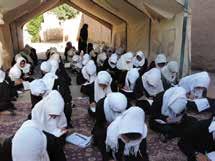
Scan to watch video

